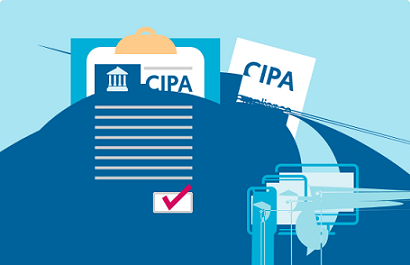What is CIPA Compliance?
What is CIPA compliance? This has been a lingering question on many people’s minds. Well, this regulatory standard is mandatory for libraries and K-12 schools that want to apply for E-Rate funding. The regulation’s foundation is the Children’s Internet Protection Act (CIPA), which got enacted by Congress in 2001. This federal law seeks to address issues relating to minors’ access to harmful web content while using school or library networks. Recently, the regulation got updated after Congress enacted further protections for minors using the Internet.

Complying with CIPA regulations means preventing minors from accessing inappropriate content online. It also entails ensuring the safety of the young ones whenever they use chat rooms, email communication, and any other form of direct electronic communication. If adhered to, CIPA compliance regulations can also empower schools and libraries to prevent unlawful activities such as hacking incidents and the unauthorized disclosure of personal information.
Before determining what is CIPA compliance, one needs first to understand what “inappropriate content” means. According to CIPA, Internet content is deemed to be inappropriate to minors if it contains pictures, images, graphic image files, that appeal to sex, nudity, or excretion. Likewise, anything that lacks serious literary, scientific, artistic, or political value to minors is considered by CIPA to be inappropriate.
What is CIPA Compliance for Schools
Schools and libraries have a legal and ethical obligation of providing a safe learning environment for both minors and adults. Complying with all the necessary CIPA requirements certifies that a school or library has mechanisms for preventing access to inappropriate content. Besides, compliance minimizes unauthorized online activities such as hacking and the disclosure of personal data.
Unlawful activities, such as cyberbullying and child pornography, will also get eradicated. Compliance enables school and library administrators to block or filter access to inappropriate Internet content with the seriousness that it deserves.
What CIPA Compliance Requires?
Libraries and schools that are subject to CIPA can only receive discounts offered via the E-Rate program after certifying that they have implemented a technology protection and Internet safety policy. The policy should highlight protection measures that are in place to filter or block access to inappropriate content, child pornography, or content that harms minors in any form. Here are some of the core CIPA compliance requirements.
- The Internet safety policy implemented by schools and libraries should also include awareness programs that will help educate minors about responsible online behavior. This includes awareness about cyberbullying, cyberattacks, and how to communicate responsibly with other users on social media networks or chat rooms. Such awareness programs help the minors to understand what is CIPA compliance and how it helps to keep them safe online.
- Libraries and schools that are seeking E-Rate funding and want to be CIPA-compliant must adopt a policy that addresses minors’ access to inappropriate web content. Likewise, schools and libraries must have a strategy for ensuring minors’ safety and security when using their networks. The Internet safety policy should also highlight unauthorized access, including hacking, and the unauthorized disclosure of the minors’ personal data.
CIPA and E-Rate Funding
Anyone who tries to understand what is CIPA compliance will realize that the end goal of compliance is to benefit from Internet connectivity discounts while keeping minors safe. To qualify for these discounts, schools must prove that the necessary technology and appropriate Internet safety policies are in place.
When applying for E-Rate funding for the first time, a school or library must be compliant with CIPA requirements. Likewise, they must certify that they have measures in place for ensuring compliance during the subsequent funding year. Similarly, schools can make this certification during their second funding year, especially when seeking a waiver.
CIPA doesn’t affect E-Rate funding for libraries and schools that only receive discounts for telecommunications services such as telephone service. Even so, it’s still prudent for such schools to be CIPA compliant since it shows that they are committed to the online safety and security of their students.
How NuEduSEC Helps Schools to Become CIPA-Compliant?
NuEduSEC offers a comprehensive suite of Internet security solutions for ensuring minors’ online safety. These solutions provide specialized capabilities, which schools and libraries can leverage to not only achieve but also demonstrate CIPA compliance.
The cloud-based software enables schools to enforce Internet access filters and other security measures to students and staff according to their needs. To become compliant, a school must show that it guarantees optimal protection to those who access the Internet via its networks or computers. Using cloud solutions such as NuEduSEC is an easy way of certifying that a school complies with CIPA as required.